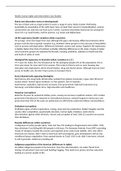Health, human rights and intervention Case Studies
Sharia law (alternative views on development):
The law of Islam and as a legal system it covers a range of areas. Rules include: theft being
punishable by amputation of the right hand, men can beat their wives for insubordination, women
cannot drive cars and men can have up to 4 wives. Countries that follow Sharia law are among the
most rich, e.g. Saudi Arabia, and the poorest, e.g. Sudan and Afghanistan.
UK life expectancy (health variations within countries):
On average, omen live longer than men although this gap is decreasing. Differences between other
groups could be due to genetic variation (e.g. between ethnic groups) or the outcome of inequalities
such as poverty and deprivation. Differences between country and county: England’s life expectancy
is slightly higher than that of Scotland, probably reflecting differences in life styles. People in higher
socio-economic groups are explained by lifestyle, housing conditions, attitudes to health and diet
and levels of safety at work.
Aboriginal life expectancy in Australia (ethnic variations in L.E.):
79.7 years for males, 83.1 for females but for the aboriginal people (3% of the population), this is
10.6 years lower for man and 9.5 for women. This is due to factors such as: poor housing, low
education and employment, ethnic discrimination, drug and alcohol abuse. Although many do have
access to health care, thy don’t have access to transport there.
Korea (diametrically opposing ideologies):
North Korea: Kim Jong family dictatorship, isolated from global community, rogue state (threat of
nuclear attack, human rights violations, no free speech), lack of statistics.
South Korea: capitalism, high income economy, firm government, high tech businesses (e.g.
Samsung), committed labour force, high education and healthcare.
Myanmar (corruption):
Ruled for 40 years by unelected military junta, causing an increase in political violence. 2011 civilian
government introduced in response to international pressure, national league for democracy runs
government but 25% of the seats are parliament are still held by unelected military representitives.
Zimbabwe (corruption):
Profitable region of Africa (agriculture, mining, steel and iron production), Robert Mugabe controls
country after competition, questionable elections, human rights violations, land reforms
discrimination against white ethnicity- misuse and corruption of land. Only 22 countries are poorer
than Zimbabwe.
Rwanda (differences within countries):
3 subgroups of native people (Hutu, Tutsi and Taw-1%) leading to disagreement and conflict. 1994,
Hutu eliminate Tutsi killing 800 000 people in 100 days. The Rwandan Patriotic Front (RPF) consisting
mostly of refugees invaded the country and regained some control and stability. UN’s role: didn’t
intervene (no interest, didn’t want to intervene with sovereignty), gave development aid but was
conditional (peace negotiation: Hutu opened border to Tutsi). USA’s role: didn’t intervene, refused
to call it genocide, stalled on providing aid.
Indigenous populations of the Americas (differences in rights):
46 million indigenous people in the Americas- they face discrimination, are under threat from
mining/ oil extraction/ dam and road building/ logging. They tend to be poorer and less educated
leading to a poorer quality of life.





